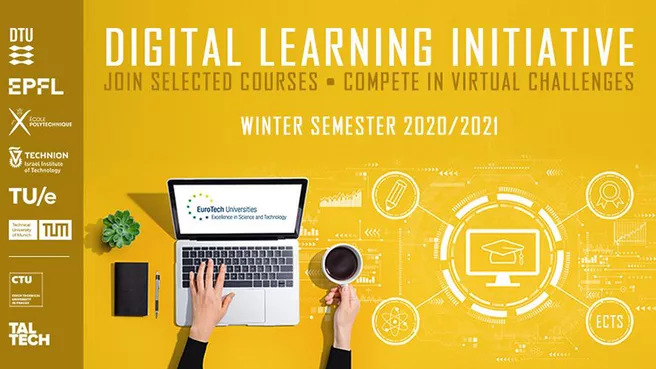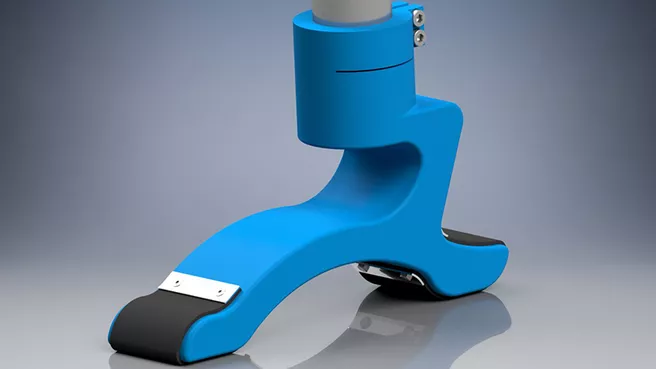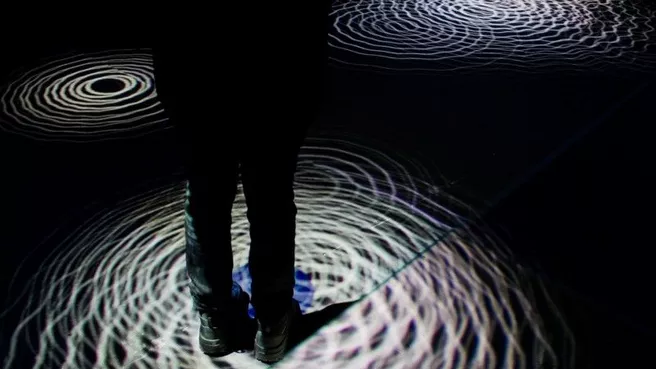The EuroTech Digital Learning Initiative, initiated and hosted by the Technical University of Munich (TUM), started in October 2020 and just concluded this February. The aim to bridge physical mobility to the other alliance partners – Technical University of Denmark (DTU), École Polytechnique (L'X), Eindhoven University of Technology (TU/e), as well as Ecole polytechnique fédérale de Lausanne (EPFL) and Technion Israel Institute of Technology – and invite our students to come together in a virtual exchange, was a full success.
The EuroTech activities are anchored in five fast developing Focus Areas, first defined in 2015 and revised in 2019. For the Digital Learning Initiative, the active research communities in the Focus Areas were asked to pilot digital educational formats. Seed funding was offered by TUM, through the national European Universities co-funding of the German Academic Exchange Service DAAD and the Federal Ministry of Education and Research.
Virtual courses and student challenges
Some partner universities offered online courses in specific areas during the winter semester 20/21, such as Introduction to Earth System Science or Global Geodetic Observing System and GNSS in the realm of EuroTech’s new collaboration in Space and Earth Observation. Other courses had a more interdisciplinary nature, such as Ethics of Responsibility: An Introduction to Applied Ethics.
Two virtual challenges in the Focus Areas Additive Manufacturing and Entrepreneurship and Innovation offered interesting project work for student teams of all partners. Mentored by a professor in the field, the students had a lot of creativity to approach the challenge and compete for the best solution.
Additive manufacturing of a lower limb prosthesis – a frugal innovation approach
Two student teams took on the task, which was formulated and supervised by Prof. Peter Mayr from the TUM Chair of Materials Engineering of Additive Manufacturing. The goal was for the students to develop an innovative, resource-saving prototype that would primarily benefit prosthesis wearers in countries of the global south. The teams designed a concept for a simple model that could be developed quickly and inexpensively while meeting high quality standards. The selection of suitable materials played a decisive role, as these must guarantee the unrestricted functionality of the various prosthesis components.
The TUM team was very happy with the ideas and performance of the two student groups. "I was very impressed by the students' commitment and creative ideas in approaching the task. It was a great pleasure to see how much fun the students had working together in international teams," said Prof. Mayr at the end of the Challenge. The students successfully investigated how plastic and metallic materials are created with the help of a 3D printer – in order to develop and produce a demonstration model for a prosthetic leg under the conditions that prevail in a developing and emerging country.
Entrepreneurship & Innovation: guided by light
The second Challenge was hosted by TU/e innovation Space under the leadership of Prof. Isabelle Reymen and supported by TU/e Intelligent Lighting Institute, Signify, and IGNITE. The task was to guide people as a group through an interactive lighting system and influence their behavior. The international team of students developed a concept to use a wristband to direct larger crowds to less crowded places and bars to create a more pleasant and relaxed atmosphere.
In addition to the actual invention, the students had to carry out a profitability calculation and a market analysis in order to finally design a practicable business model. This is linked to the great hope that major events will soon be part of student life again and that the luminous wristband can soon be tested in real life.
Successful in international teams
Intercultural awareness and a common understanding are key to productive and trusting cooperation in a global environment. All participants of the student challenges were invited to join an intercultural training course alongside of their project work. This training was especially relevant as students only met online due to the pandemic.
They were coached to acquire intercultural competences including team development, culture and its dimensions and influence on teamwork, as well as the basics of conflict management in an intercultural context. Students were excited about this additional offering and plan to apply what they learned in future face-to-face and virtual meetings.
Scaling up: EuroTeQ Engineering University
The EuroTech Digital Learning Initiative will be continued in the efforts of the EuroTeQ Engineering University. The EuroTech partners, together with TalTech from Estonia and CTU from the Czech Republic, will establish a joint engineering sciences study program across different disciplines as well as across national and institutional boundaries. Granting access to digital courses and enhancing student mobility – be it physical or virtual – are key elements of the interuniversity EuroTeQ Campus. Challenge-based formats are continued and rolled-out to students, vocational and professional learners in the EuroTeQ Colliders.
If you are interested to engage in our projects, please contact Maria-Valerie Schegk.


